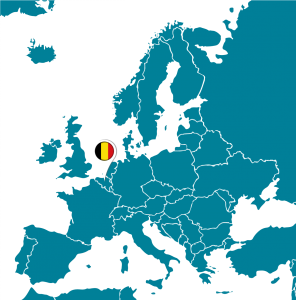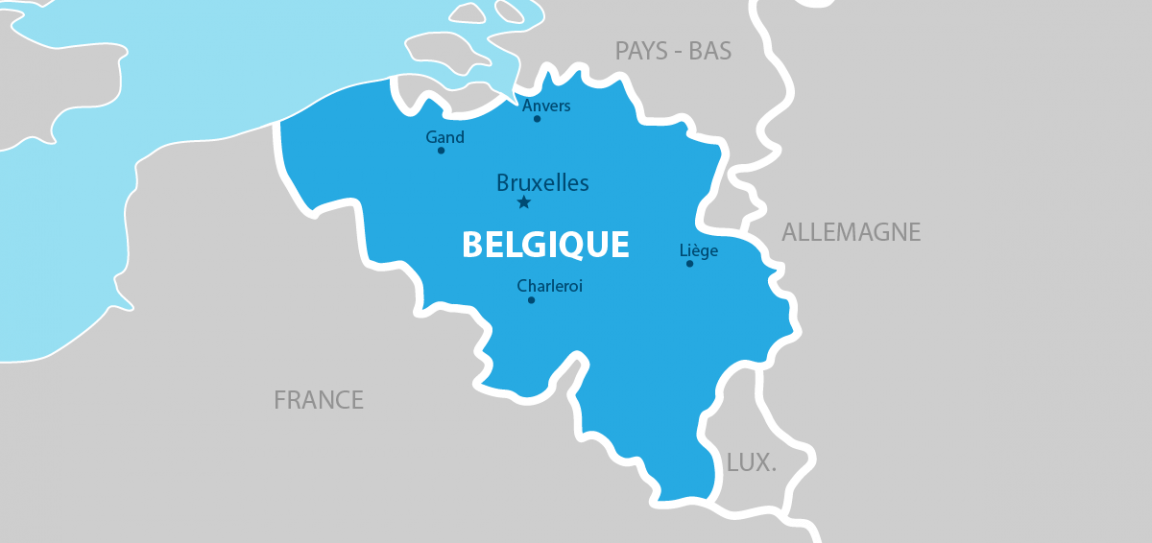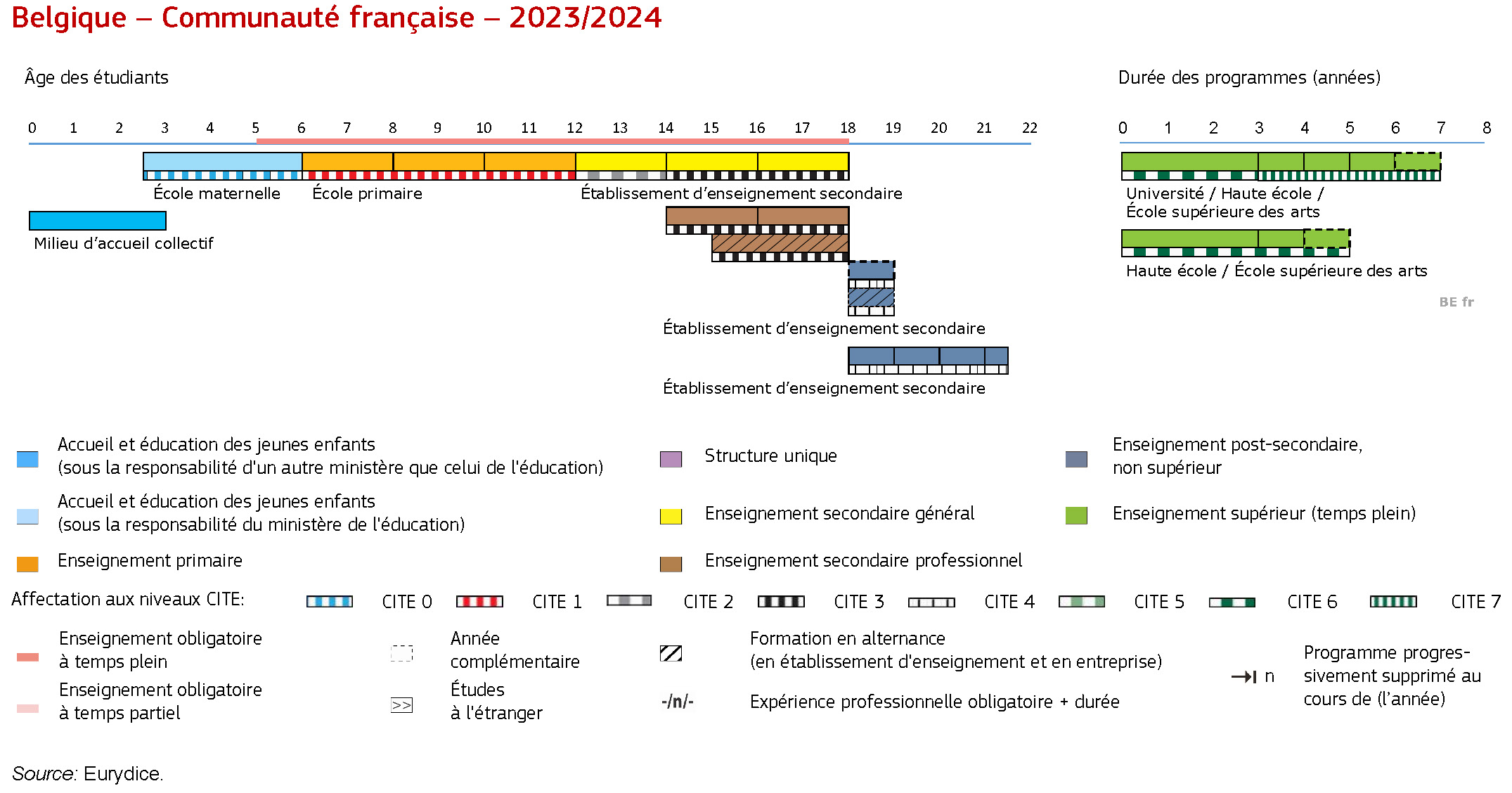Liège
Presentation of the country
Belgium
Federal parliamentary constitutional monarchy
Bank holidays: 21 July
Official languages: Dutch, French, German
Area code: 32
Capital: Brussels
Surface area: 30,688 km²
Population: 11.69 million
Date of EU accession: 1957
Growth rate: 3.0
Unemployment rate: 5.4
Source: https://eacea.ec.europa.eu


The Education System

Principal characteristics of the education system
Educational Competencies
In Belgium, the Communities are responsible for education, with the exception of three areas which remain federal matters:
- Beginning and end of compulsory schooling ;
- Mininum requirements for obtaining diplomas ;
- Pension scheme for employees in the education system.
Education in each community is provided in the language of the community in question.
The French Community is responsible in particular for cultural matters and the use of languages, as well as in the fields of education, childhood, youth and research. The Government of the French Community has four ministers directly involved in early childhood care and education: Minister of Education (responsible for education from pre-school)
, Minister for Early Childhood, Minister of Higher Education, Media and Scientific Research, Minister for Education, Youth, Women’s Rights and Equal Opportunities. A fifth Minister is responsible for the budget, the civil service and administrative simplification for the French Community. The Walloon Regional Government has a Minister responsible for training and formations
Freedom of teaching and school choice
In Belgium, freedom of education is a constitutional right. Anyone (natural or legal) has the right to organize education and set up schools for this purpose. The government has a duty to organize non-confessional education (according to certain criteria).
The Constitution also guarantees freedom of school choice for parents. Parents and children must have access to the school of their choice within a reasonable distance of their place of residence.
The teaching networks
In Belgium, education is organized into different networks.
Education organized by the government is called official education. Education organized by a natural or legal person or organization is called free education (subsidized education).
A small number of schools are not recognized by the government. These are private schools that receive no government funding.
In the French Community, there are three main educational networks:
• Public (official) educational establishments organized and managed by the government of the French Community. They are required to respect the philosophical and religious choices of all parents ;
• Public (official) educational establishments subsidized by the French Community are managed by provincial or municipal authorities ;
• Denominational or non-denominational educational establishments subsidized by the French Community and managed by natural or legal persons. This network mainly comprises Catholic schools. In addition to denominational schools, this network also includes schools with no religious ties, such as “alternative” schools (based on the ideas of Freinet, Montessori or Steiner) that apply specific teaching methods.
In Belgium, the authorities of an educational network can join a coupole organization (a representative and coordinating body). It represents the organizing authorities in government consultations and offers services to their schools, such as curriculum development and timetables.
Guidance centers
In Belgium, students, parents, teachers and organizing authorities can request information or advice from a guidance center.
The services offered by these centers are free of charge, and mainly cover the following four areas:
- Learning and study ;
- School development ;
- Health and prevention ;
- Socio-emotional development.
Organisation of the education system
Compulsory education
In order to guarantee constitutional rights to education, compulsory education has been introduced for all children resident in Belgium. Education is compulsory from age 5 to 18.
A child must attend full compulsory education until the age of 15. From the age of 15, students can enroll in part-time education and opt for a structured learning pathway that combines part-time vocational education in a school with part-time employment.
Basic education
In Belgium, basic education includes nursery and primary education.
Nursery education is available for children aged 2.5 to 6. Almost all children attend nursery school, although it is not compulsory up to the age of 5. From the age of 5, nursery education has been compulsory since the 2020-2021 school year. Kindergarten provides comprehensive training for children and stimulates their cognitive, motor and emotional development.
Primary education is for children aged 6 to 12, and covers the following six years.
On successful completion of elementary school, children obtain a certificate.
Secondary school
In Belgium, secondary education is organized for young people aged 12 to 18. Full secondary education comprises three levels and different types of teaching.
Each level comprises two years. In the third stage of vocational education, the successful completion of a third year is required to obtain the certificate of upper secondary education.
In the first stage of secondary education, students are offered a common program. Only at the beginning of the second stage do students make a choice of studies.
From the second level onwards, students are offered four different types of teaching.
In the French Community, education comprises 4 forms (general, technical, artistic and vocational) and 2 sections (transition section and qualification section).
The transition section prepares students to continue their studies in higher education, while offering opportunities to enter working life, while the qualification section prepares students to enter working life while continuing their studies in higher education. General education is transitional, while vocational education is qualifying. Technical and artistic education can be organized in both transition and qualification sections.
Students choose one of these types of education.
In Belgium, the certificat of the upper-secondary education gives unrestricted access to higher education.
Specialized teaching
In addition to mainstream education, Belgium also offers nursery, primary and secondary specialized education. Special education is organized for children who require specific support on a temporary or permanent basis, due to physical or mental incapacity, serious behavioral or emotional problems, or severe learning disabilities.
However, in July 2015, by decree, the Parliament of the French Community took new measures in terms of orientation and integration support for special education pupils in mainstream education. It is now only if integration is not possible in mainstream education that referrals are made to special education. In the case of full permanent integration, each pupil integrated into basic education and the first two levels of ordinary secondary education will be granted 4 periods of support provided by special education staff.
On the basis of the resources made available, 450 additional periods of support may be granted on the recommendation of the General Council for Special Education, in particular to special education establishments with adapted teaching methods or special projects.
Work-linked teaching system
In Belgium, when a student reaches the age of 15 or 16, he or she can choose a part-time education system. All young people in part-time education are obliged to take part in teaching for at least 28 hours a week. Part-time education is organized in :
- work-study education and training centers
- apprenticeship centers.
In the French-speaking Community, at the Alterning Education and Training Centers, students attend classes for 15 hours a week. These courses are complemented by work experience, which corresponds to the program followed. Pupils can obtain the same certificates and qualifications as in ordinary full-qualification education, or lower levels of qualification through specific profiles.
In the French Community, apprenticeships are organized by IFAPME (Walloon Institute for Work-Study Training and for the Self-Employed and Small and Medium-Sized Enterprises – in the Walloon Region) and EFPME (SME Training Service – in the Brussels-Capital Region). These two institutions organize work-study programs known as apprenticeship contracts, which enable students to meet their compulsory schooling requirements.
For further infomation
Mobility Group
Organisation
City
Position
Host organisations
Institutional Partner
Host organisations
Organisation
City
Level/Type of the organisation
xxx
xxx
High school
xxx
xxx
Vocational training school for teachers
xxx
xxx
Primary and secondary school
Presentation
Mobility Group
Host Organisations

![PRO_Logo_Quadri [Converti]](https://prisme-educ.com/wp-content/uploads/2024/10/logo-Liege.jpg)